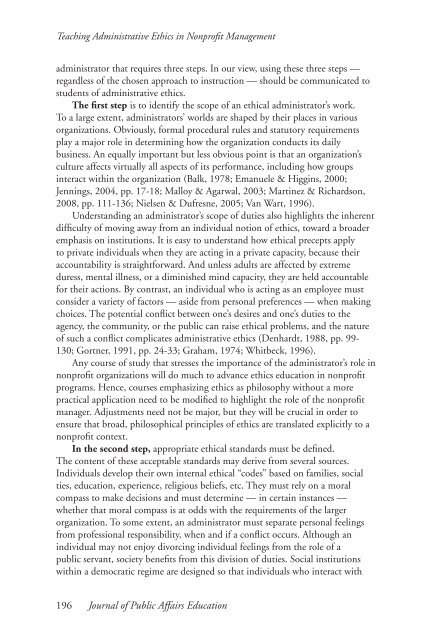JOURNAL OF PUBLIC AFFAIRS EDUCATION - Naspaa
JOURNAL OF PUBLIC AFFAIRS EDUCATION - Naspaa
JOURNAL OF PUBLIC AFFAIRS EDUCATION - Naspaa
You also want an ePaper? Increase the reach of your titles
YUMPU automatically turns print PDFs into web optimized ePapers that Google loves.
Teaching Administrative Ethics in Nonprofit Managementadministrator that requires three steps. In our view, using these three steps —regardless of the chosen approach to instruction — should be communicated tostudents of administrative ethics.The first step is to identify the scope of an ethical administrator’s work.To a large extent, administrators’ worlds are shaped by their places in variousorganizations. Obviously, formal procedural rules and statutory requirementsplay a major role in determining how the organization conducts its dailybusiness. An equally important but less obvious point is that an organization’sculture affects virtually all aspects of its performance, including how groupsinteract within the organization (Balk, 1978; Emanuele & Higgins, 2000;Jennings, 2004, pp. 17-18; Malloy & Agarwal, 2003; Martinez & Richardson,2008, pp. 111-136; Nielsen & Dufresne, 2005; Van Wart, 1996).Understanding an administrator’s scope of duties also highlights the inherentdifficulty of moving away from an individual notion of ethics, toward a broaderemphasis on institutions. It is easy to understand how ethical precepts applyto private individuals when they are acting in a private capacity, because theiraccountability is straightforward. And unless adults are affected by extremeduress, mental illness, or a diminished mind capacity, they are held accountablefor their actions. By contrast, an individual who is acting as an employee mustconsider a variety of factors — aside from personal preferences — when makingchoices. The potential conflict between one’s desires and one’s duties to theagency, the community, or the public can raise ethical problems, and the natureof such a conflict complicates administrative ethics (Denhardt, 1988, pp. 99-130; Gortner, 1991, pp. 24-33; Graham, 1974; Whitbeck, 1996).Any course of study that stresses the importance of the administrator’s role innonprofit organizations will do much to advance ethics education in nonprofitprograms. Hence, courses emphasizing ethics as philosophy without a morepractical application need to be modified to highlight the role of the nonprofitmanager. Adjustments need not be major, but they will be crucial in order toensure that broad, philosophical principles of ethics are translated explicitly to anonprofit context.In the second step, appropriate ethical standards must be defined.The content of these acceptable standards may derive from several sources.Individuals develop their own internal ethical “codes” based on families, socialties, education, experience, religious beliefs, etc. They must rely on a moralcompass to make decisions and must determine — in certain instances —whether that moral compass is at odds with the requirements of the largerorganization. To some extent, an administrator must separate personal feelingsfrom professional responsibility, when and if a conflict occurs. Although anindividual may not enjoy divorcing individual feelings from the role of apublic servant, society benefits from this division of duties. Social institutionswithin a democratic regime are designed so that individuals who interact with196 Journal of Public Affairs Education
















